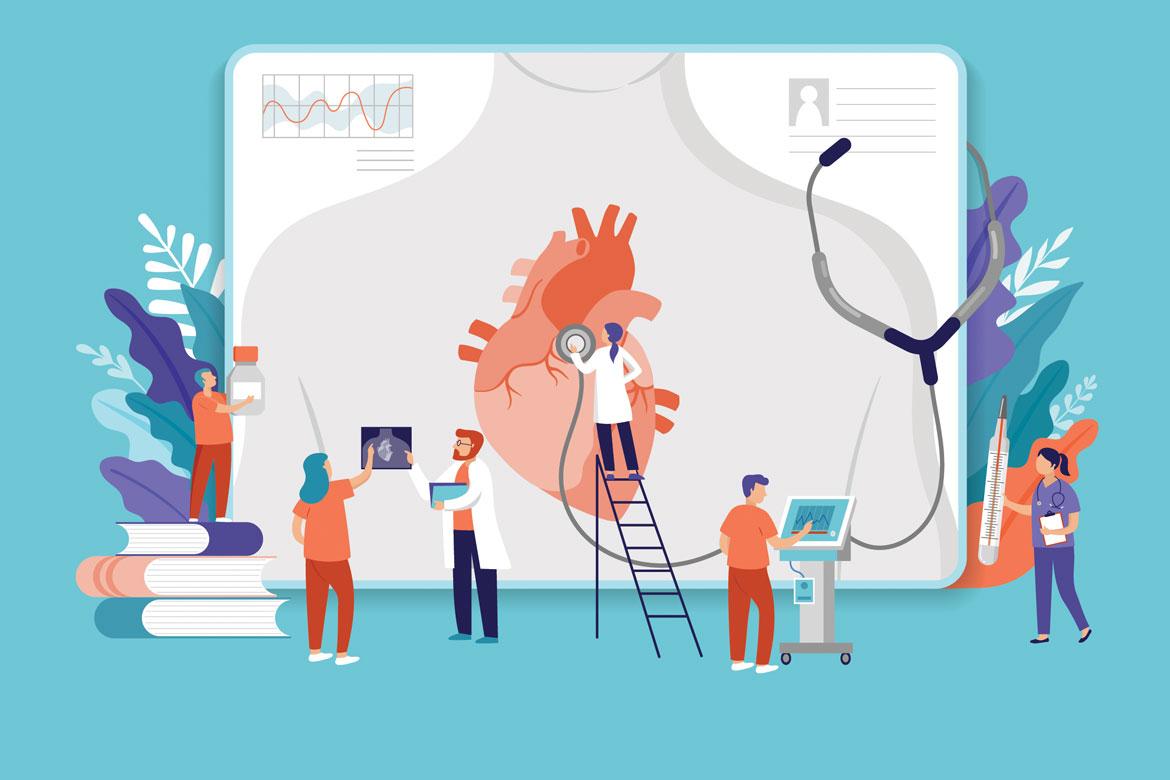-
-
Khu vực chăm sóc và điều trị

Suy tim
Suy tim là gì?
Suy tim là tình trạng tim không thể bơm đủ lượng máu cung cấp cho các mô trong cơ thể. Bệnh này còn được gọi là:
- Suy tim sung huyết
- Suy tim ứ huyết
Suy tim khiến các cơ quan và mô chính trong cơ thể không có đủ oxy và chất dinh dưỡng. Kết quả là các cơ quan và mô có thể không hoạt động bình thường. Điều này cũng dẫn đến phù, nghĩa là tích tụ dịch trong các mô.
Các loại suy tim
Có nhiều loại suy tim khác nhau:
- Suy tim trái, trong đó dịch có thể đọng lại trong phổi và gây khó thở.
- Suy tim phải, trong đó dịch có thể đọng lại trong bụng, chân và bàn chân, gây sưng.
- Suy tim tâm thu, dẫn đến tâm thất trái không thể co lại vừa đủ.
- Suy tim tâm trương, dẫn đến tâm thất trái không thể giãn ra hay được đổ đầy đến mức vừa đủ.
Suy tim là một bệnh mạn tính đi kèm với hậu quả nghiêm trọng. Bệnh ảnh hưởng đến sức khỏe tổng quát, bao gồm trạng thái tinh thần, thể chất và xã hội của bạn. Tỷ lệ hiện hành của suy tim tăng theo độ tuổi.
Mặc dù chưa có cách để chữa khỏi suy tim, việc kết hợp giữa thay đổi thói quen sinh hoạt, dùng thuốc và đôi khi là cả phẫu thuật có thể hỗ trợ kiểm soát và điều trị căn bệnh này.
Triệu chứng của suy tim là gì?
Bệnh nhân bị suy tim có thể gặp phải bất kỳ triệu chứng nào sau đây:
- Đau ngực (đau thắt ngực)
- Ngất xỉu và chóng mặt do cung cấp máu và oxy không đủ cho các cơ quan và cơ
- Kiệt sức do cung cấp máu và oxy không đủ cho các cơ quan và cơ
- Khó thở do tích tụ dịch trong phổi
- Sưng bàn chân, mắt cá chân và chân do tích tụ dịch trong tĩnh mạch và mô cơ thể
- Tăng cân do dư thừa dịch trong cơ thể
- Sụt cân
Lưu ý: Suy tim là một bệnh lý nghiêm trọng cũng có thể dẫn đến tử vong đột ngột.
Thời điểm nên đến khám tại Khoa Cấp cứu (UCC)?
Nếu bạn gặp bất kỳ triệu chứng nào sau đây, hãy đến khám tại khoa UCC ngay:
- Ngất xỉu
- Đau ngực
- Rất yếu
- Nhịp tim nhanh hoặc rối loạn nhịp tim kèm theo khó thở, đau ngực hoặc ngất xỉu
- Khó thở đột ngột, nặng kèm với ho ra chất nhầy màu hồng, nhiều bọt
Nguyên nhân gây suy tim là gì?
Suy tim có thể do bệnh tim và các bệnh lý khác ảnh hưởng đến khả năng bơm máu hiệu quả của tim. Các nguyên nhân thường gặp bao gồm:
- Bệnh cơ tim là bệnh làm cho cơ tim yếu đi. Bệnh mạch vành và các bệnh lý về tim khác có thể dẫn đến bệnh cơ tim.
- Bệnh mạch vành là tình trạng cứng ở các động mạch cung cấp máu cho tim do mảng lắng đọng chất béo tích tụ trong thành động mạch. Điều này làm hạn chế khả năng bơm máu của tim. Đây là một trong những nguyên nhân phổ biến nhất gây suy tim.
- Dị tật ở van tim và bệnh tim bẩm sinh (khuyết tật tim từ khi mới ra đời).
- Huyết áp cao khiến tim phải làm việc nhiều hơn để cung cấp máu cho cơ thể.
Các yếu tố liên quan đến thói quen sinh hoạt như sử dụng quá nhiều bia rượu và lạm dụng chất gây nghiện cũng có thể góp phần gây suy tim.
Biến chứng và các bệnh liên quan của suy tim là gì?
Các biến chứng do suy tim phụ thuộc vào các yếu tố như sức khỏe tổng thể và độ tuổi. Các biến chứng có thể bao gồm:
- Rối loạn nhịp tim hoặc nhịp tim không đều
- Vấn đề về van tim, do tim bị phì đại hoặc áp lực cao trong tim
- Tổn thương gan, vì suy tim có thể dẫn đến sự tích tụ dịch. Điều này làm tăng áp lực lên gan. Sự tích tụ dịch cũng có thể dẫn đến sẹo và làm suy giảm chức năng gan hơn nữa.
- Tổn thương thận do giảm lưu lượng máu đến thận.
- Suy thận, có thể cần lọc máu
- Tử vong
This coverage checker is brought to you by Health Insured, an online resource that helps you understand your health coverage in Singapore.
Trang này đã được kiểm duyệt.
Bạn cần trợ giúp?
Để biết thêm thông tin, vui lòng gọi
+65 6575 7575
Để đặt lịch hẹn, vui lòng dùng WhatsApp
+65 8111 9777





